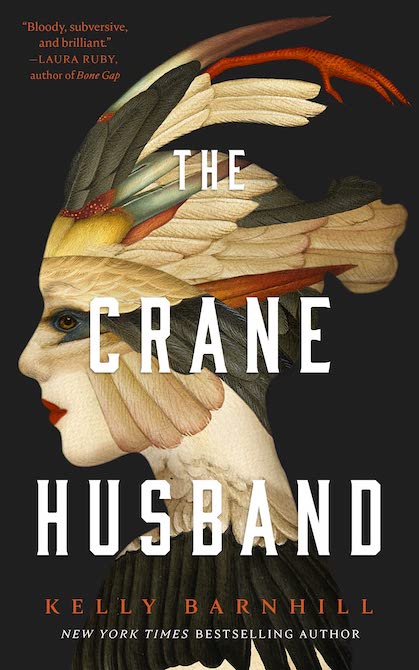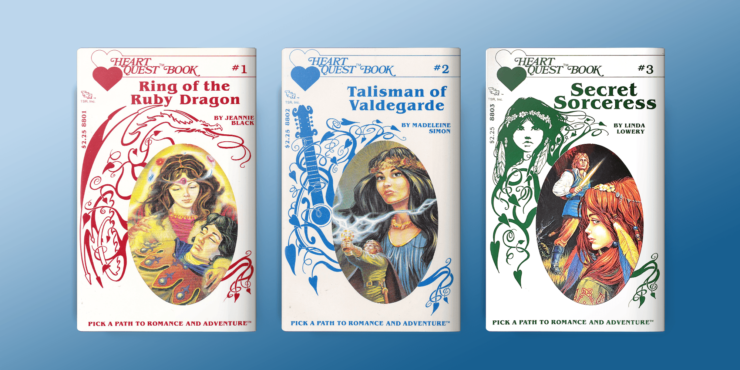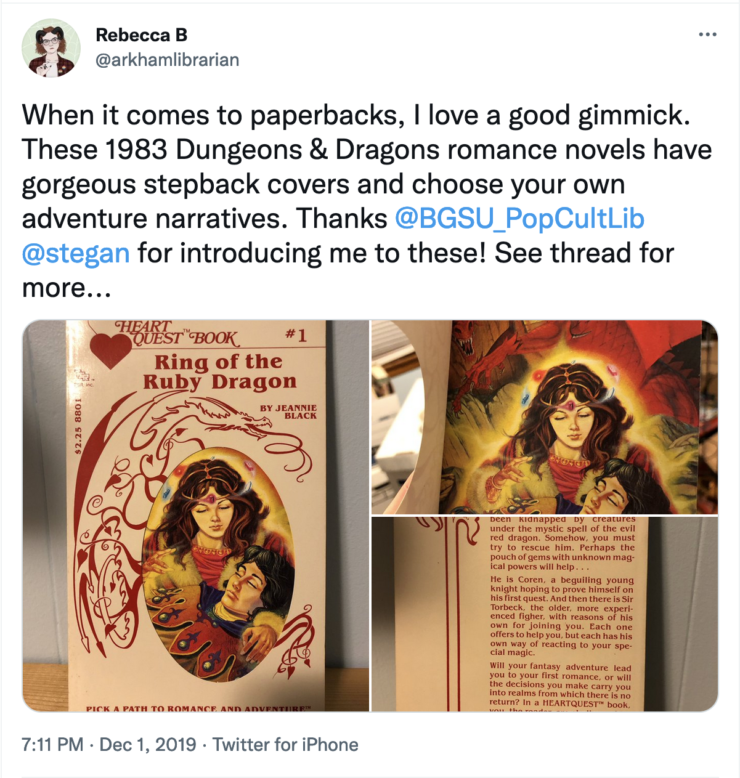I have spent a lot of my time lately being deeply obsessed with Dungeons & Dragons. I started watching a ton of D&D shows like Critical Role, Oxventure, and Dimension 20, and I’ve joined a D&D group to play the game myself. We meet every Tuesday, my terrible wizard has only 30 hit points, and it’s the highlight of my week. D&D lets you live out some of your most deeply desired fantasies; having a friend group to hang out with, earning an appropriate amount of money for any work you do, and actually getting to take a long rest once in a while. And, back in the ’80s, you could add romance to that wish list.
Dungeons & Dragons is enjoying a surge in popularity right now and it’s easy to forget how old the game actually is. Created in 1974 by Gary Gygax, the game has gone through many, many different iterations in pop culture. It’s been misunderstood, vilified as Satanic, scorned as the refuge of basement-dwelling dweebs, and caricatured to score cheap comedic points in sitcoms and movies. At various points in its history D&D has tried to shake off those stereotypes to show that tabletop RPGs can be for everyone. This translated into a focus on publishing fantasy fiction beginning in the 1980s, leading to the launch of the Dragonlance novels and the creation of other memorable settings and characters like Drow ranger Drizzt Do’Urden and wizard/adventurer Volothamp Geddarm.
Seeking a way to get more young women involved in the roleplaying game (despite the fact that girls have been playing since the beginning, but that’s another story entirely), Dungeons & Dragons also branched out and commissioned a series of Choose Your Own Adventure-style romance novels. Since you probably haven’t heard of them, you can rightly assume they didn’t set the publishing world on fire—but they are fascinating relics, especially for fans of D&D and/or ’80s romance novels. Personally, I had never heard of these books either, until I ran across an amazing Twitter thread from 2019 in which Rebecca B (@arkhamlibrarian) shared the details on the first four novels, completely blowing my mind…
The first thing that occurred to me is that in taking this approach to reaching a new audience, D&D clearly recognized a reality many others tend to dismiss—romance novels are widely read, widely shared, and often very lucrative for the publisher. For far too long, the romance genre was denigrated or dismissed as silly or valueless for reasons rooted firmly in sexism and misogyny—in spite of the fact that the genre is (and has long been) hugely popular and commercially successful. Perhaps it’s no surprise that the folks behind D&D, very used to being dismissed for similarly shortsighted reasons, were willing to give it a shot.
Called “HeartQuest Books,” the initial series of six novels were written by romance novelists under pseudonyms. Each book took a character class from D&D (druid, wizard, rogue, etc) and cast a young woman protagonist in that role, figuring out her magic and her worth in a dangerous fantasy world while also dealing with the trials and tribulations of falling in love. Each book was illustrated by Larry Elmore, well known for his fantasy artwork, including his illustrations and concept art for other D&D projects and materials. His paintings lent the books a more classic fantasy lineage and gave them a similar signature style to D&D game books of the era.
The stories in the books themselves sound slightly overwrought, like all the best classic romance novels of the ‘80s, and yet also really fun and exciting. The first novel in the set, Ring of the Ruby Dragon by Jeannie Black, is the story of Chandelle, a young woman who must save her kidnapped jeweler father from great harm with a bag of magical gems. The book is written in the second person, with the reader assuming the role of Chandelle as she faces various choices. At your side are the handsome knight Coren and roguish fighter Sir Torbeck, who vie for your affections while helping you pull off this most daring of rescues. Call me crazy, but I want to read this right now. Chandelle’s adventures sound action-packed and dramatic in just the very best way, suitable for an afternoon of lazy reading (or as a jumping-off point for a hilarious D&D session with some friends).
Buy the Book


The Crane Husband
The other books are apparently just as fantastical, casting you as a druid priestess falling for a charismatic and secretive bard, or as a lady knight torn between a noble thief or a cunning mage. Since they’re written in the Choose Your Own Adventure-style, the books offer readers the feeling of participating in a D&D campaign and determining your own fate (no dice needed!), with the added bonus of immediate re-readabilty as you try to find the best ending for these characters. Honestly, it’s such a great idea, I almost want D&D to try this again. The books somehow evoke the same female-focused fantasy vibes of Garth Nix’s Sabriel or Tamora Pierce’s Tortall books—and even now, we can always use more of that in the fantasy genre.
Alas, the initial HeartQuest books didn’t sell as well as the publisher had anticipated and the series was cancelled after six volumes. The paperbacks are hard to find now and considered expensive rarities if you do manage to snag one. It’s a shame—it feels like they were really onto something here. Branching out into the romance genre was a new strategy for D&D back in the ‘80s and it didn’t seem to fit quite as well as they would have hoped at the time—it’s not like today, where popular D&D romances like Critical Role’s Caleb Widogast and Essek Thelyss rack up thousands and thousands of hits on Twitter and Archive of Our Own. There are tons of guides online on how to introduce romance into your D&D campaigns and it’s become an interesting game mechanic to try. Romance isn’t just for bards seducing dragons anymore!
So maybe it’s time to give it another shot. What do you say, Wizards of the Coast? Time to give D&D romance novels a second chance and make it work this time… I’ll be first in line to pre-order a set! My terrible wizard with 30 hit points could really use the help.
Originally published November 2021.
Meghan Ball is a writer, editor, and goth disaster. She enjoys playing guitar, doing cross stitch, and spending way too much time on Twitter. You can find her there at @EldritchGirl. Her work has appeared in Uncanny Magazine, Tor Nightfire, and the 3,2,1… Action! series of roleplaying games. She currently lives in a weird part of New Jersey.











